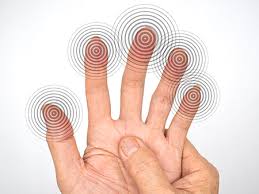"The Silent Sensation: Understanding Numbness, Its Causes, and Prevention".
"The Silent Sensation:
Understanding Numbness, Its Causes, and Prevention"
Overview:
Numbness, or paresthesia, is a condition that involves a loss or alteration of sensation, often described as tingling, prickling, or a “pins and needles” feeling. It can be temporary or chronic, mild or severe, depending on its cause. This sensation usually occurs in the extremities like hands, feet, fingers, and toes but can affect other parts of the body.
Causes of Numbness
Nerve Compression:
- Carpal Tunnel Syndrome: Compression of the median nerve in the wrist.
- Sciatica: Compression of the sciatic nerve in the lower back leading to leg numbness.
- Herniated Disc: Can compress nerves leading to numbness in the arms or legs.
Poor Circulation:
- Peripheral Artery Disease (PAD): Narrowing of the arteries reduces blood flow, causing numbness.
- Vascular Disease: Any condition that restricts blood flow can cause numbness, especially in the extremities.
Chronic Conditions:
- Diabetes: Diabetic neuropathy is a common complication where high blood sugar damages nerves, leading to numbness, particularly in the feet and legs.
- Multiple Sclerosis (MS): This autoimmune disease affects the central nervous system, leading to nerve damage and resulting in numbness.
Vitamin Deficiency:
- Vitamin B12 Deficiency: A lack of this essential vitamin can cause nerve damage, leading to tingling or numbness in hands and feet.
- Folate and B6 Deficiency: These vitamins are crucial for nerve health; deficiencies can result in neurological symptoms like numbness.
Injury and Trauma:
- Direct trauma to nerves from an injury, accident, or surgery can lead to either temporary or permanent numbness in affected areas.
Infections and Autoimmune Diseases:
- Shingles (Herpes Zoster): This viral infection can cause nerve inflammation leading to numbness and tingling.
- Lyme Disease: If untreated, Lyme disease can result in neurological symptoms, including numbness.
Medications and Toxins:
- Certain medications, especially chemotherapy drugs or those used to treat HIV, can cause peripheral neuropathy, leading to numbness.
- Exposure to toxic chemicals like lead or alcohol abuse can also damage nerves over time.
Main Reasons for Numbness:
- Nerve Compression: Conditions like carpal tunnel syndrome, sciatica, or pinched nerves in the neck or back.
- Poor Circulation: Reduced blood flow due to conditions like peripheral artery disease or prolonged pressure on a limb.
- Diabetes: Can cause peripheral neuropathy, a common cause of numbness in the hands and feet.
- Vitamin Deficiency: Particularly vitamins B12, B6, or folate deficiencies can lead to nerve damage and numbness.
- Injury: Trauma to a nerve or nearby area can cause temporary or permanent numbness.
- Multiple Sclerosis: An autoimmune disorder that damages nerves, leading to numbness or tingling.
- Medications: Some drugs, especially those used for chemotherapy, can cause nerve damage.
- Infections: Conditions like Lyme disease, shingles, or HIV can affect nerves.
Foods That Help Alleviate Numbness:
- Vitamin B12 Sources: Shellfish, meat, fortified cereals, and dairy products are rich in B12, crucial for nerve repair.
- Vitamin B6: Found in bananas, chicken, turkey, and potatoes, B6 helps maintain nerve function.
- Magnesium: Leafy greens, nuts, seeds, and legumes boost circulation and nerve health.
- Folic Acid: Found in lentils, spinach, and broccoli, folic acid plays a role in reducing numbness due to its nerve-repairing properties.
- Omega-3 Fatty Acids: Fish, chia seeds, and flaxseeds contain anti-inflammatory compounds that can protect nerve health.
Prevention and Precautions:
- Posture and Ergonomics: Avoid positions that place prolonged pressure on nerves. Adjust your workspace to prevent wrist, neck, and back strain.
- Exercise Regularly: Physical activity improves circulation and helps prevent conditions like diabetes or PAD, which can lead to numbness.
- Healthy Diet: Ensure you get enough nutrients, particularly vitamins B6, B12, and folate, which are essential for nerve health.
- Manage Chronic Conditions: Proper management of diseases like diabetes, arthritis, or multiple sclerosis can help prevent or reduce numbness.
- Take Breaks: If your job involves repetitive tasks, like typing or standing for long hours, take regular breaks to avoid prolonged pressure on nerves.
- Wear Proper Footwear: Ill-fitting shoes can cause nerve compression, especially in people with diabetes or poor circulation.
- Stay Hydrated: Dehydration can impair circulation and nerve function, leading to numbness.
When to Seek Medical Help:
Persistent numbness, especially when accompanied by other symptoms like weakness, vision problems, or difficulty speaking, may indicate a serious underlying condition like a stroke or multiple sclerosis. Always consult a healthcare professional if numbness becomes chronic, severe, or unexplained.










Comments
Post a Comment